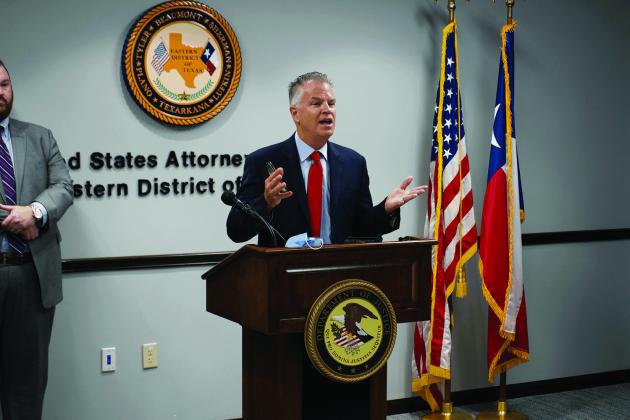A Kirkland, Washington, man earned 51 months in federal prison after defrauding elderly victims in Texas of more than $890,000 through a series of phone scams, announced U.S. Attorney Brit Featherston Aug. 2.
In a scheme that netted more than $6 million from unwitting Americans, Aakash Kalpesh Gandhi, 28, pleaded guilty on Nov. 4, 2021, to conspiracy to commit mail fraud and was sentenced to 51 months in federal prison Aug. 2 by U.S. District Judge Marcia Crone for stealing “more than $890,000” from victims in Southeast Texas and beyond. Judge Crone also ordered Gandhi to pay restitution to his victims, many of whom are elderly. The exact amount has not yet been determined.
“We need help getting the word out to look out for our neighbors,” said Featherston. “Our greatest generation is constantly being attacked by phone and computer scammers. Tricked, our elderly and some not-so-aged generations are falling prey to phone scammers who threaten them with jail time if they don’t withdraw, package and mail money across the country. No government agency will threaten you with jail over the phone and then demand cash be wrapped in foil and mailed.
“What happened in this case was our local victim contacted the Beaumont Police Department and they contacted Homeland Security and they contacted our office. Then, we realized there were connections all throughout the country. Homeland Security was working on this case all over the country.”
“Scoundrels” like Gandhi take advantage of senior citizens, according to Featherston, who revealed Gandhi was part of a large network that houses hundreds of callers who spend their days calling and scamming.
Of the 19 victims, Featherston confirmed that multiple were from East Texas, with at least one in Beaumont. However, officials indicated that number could be much higher simply because some victims are embarrassed to admit they’ve fallen prey to a con artist.
“We estimate that about 30% of elder fraud does not get reported for that exact reason,” Featherston said, “because it’s embarrassing to get taken advantage of. All of us would get embarrassed by this and might think twice before reporting it, knowing that it’s going to get out.”
“When in doubt about a possible scam call or email, contact someone you trust and ask them if the call is legitimate or contact your local law enforcement,” Featherston advised. “Gandhi’s scam would have been thwarted if a victim would have simply googled ‘social security phone scams,’ and the very quick search result would show the phone call was a scam. Preventing someone from being a victim is a lot easier than trying to recover the stolen money after the fact.”
According to information presented in court, Gandhi and his co-conspirators operated a scheme designed to defraud victims throughout the United States. Co-conspirators from call centers based in India would target unsuspecting victims and claimed that those victims would suffer financial ruin or criminal liability if they did not immediately send money to correct fictional problems often involving the victim’s social security benefits. To enhance the viability of the scheme, co-conspirators fraudulently identified themselves as government agents to their unsuspecting victims.
Gandhi tracked currency shipments for the conspiracy and recovered packages of United States currency shipped by those who had been victimized by the scheme, including victims within the Eastern District of Texas. Gandhi would receive a fee from a portion of the contents of those packages and deliver the remaining currency to co-conspirators. A majority of the funds were ultimately distributed to various locations in India. Gandhi was indicted by a federal grand jury in Beaumont on July 8, 2021.
The U.S. Attorney’s Office has made a concerted effort to not only prosecute those involved with these illegal activities, but to educate and inform the public on the many fraudulent schemes targeting our seniors and how to avoid them. Assistant U.S. Attorneys across the Eastern District of Texas have visited various senior facilities and community groups to provide outreach and educate the public on how to protect themselves and their families. Groups or organizations that are interested in securing a speaker for their event should contact Assistant U.S. Attorney Camelia Lopez at (972) 509-1201.
“We have, all summer, been going around to different community groups and elderly groups, talking to them about this exact thing,” said Davilyn Walston, public affairs officer at the U.S. Attorney’s Office. “If anyone is interested in having our Assistant U.S. Attorneys come and talk, we can set that up.”
“If you or someone you know is age 60 or older and has been a victim of financial fraud, help is standing by at the National Elder Fraud Hotline: 1-833-FRAUD-11 (1-833-372-8311),” offered Walston. “This U.S. Department of Justice hotline, managed by the Office for Victims of Crime, is staffed by experienced professionals who provide personalized support to callers by assessing the needs of the victim, and identifying relevant next steps. Case managers will identify appropriate reporting agencies, provide information to callers to assist them in reporting, connect callers directly with appropriate agencies, and provide resources and referrals, on a case-by-case basis. Reporting is the first step. Reporting can help authorities identify those who commit fraud and reporting certain financial losses due to fraud as soon as possible can increase the likelihood of recovering losses. The hotline is staffed 10 a.m. to 6 p.m. Eastern Time, Monday through Friday. English, Spanish, and other languages are available.”


